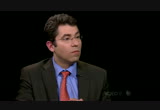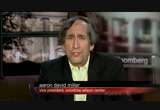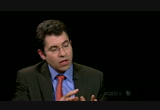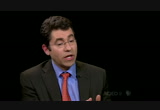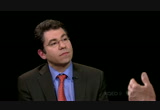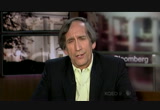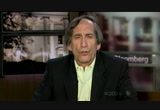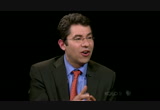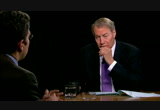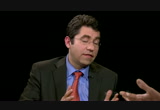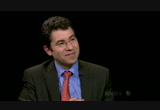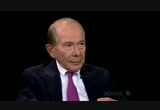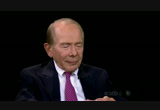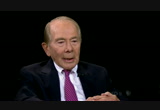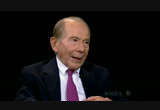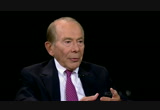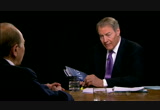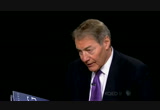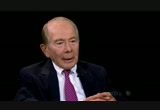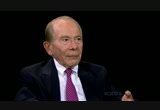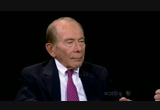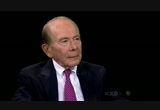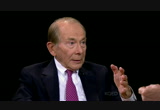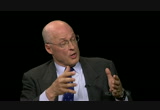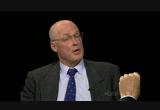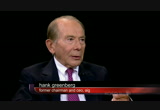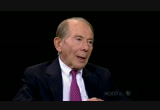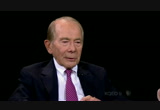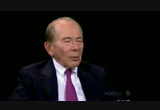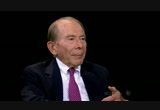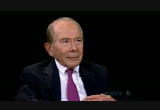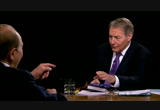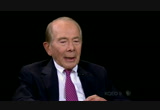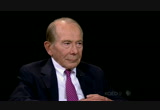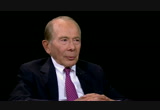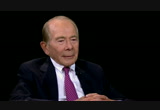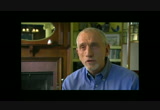tv Charlie Rose PBS March 19, 2013 12:00pm-1:00pm PDT
12:00 pm
captioning sponsored by rose communications from our studios in new york city, this is charlie rose. >> rose: president obama will travel to the middle east this week. it will be his first time visiting since he entered the white house four years ago. he will meet newly reelected prime minister benjamin netanyahu in jerusalem on wednesday. the president has often been criticized for his distance relationship with the israeli leader but many see this visit as a chance to make things better. much is at stake as israel grapples with a nuclear iran and a lagging peace process. joining me, aaron david miller, vice president of woodrow wilson international center for scholars and a former middle east advisor to democratic and
12:01 pm
republican secretaries state. here in new york, steven cook of the council on foreign relations. i'm pleased to have both of them back on this program. let me begin with you steven what's the hope of this trip? >> well, the hope is at least officially for the president to reset his relationship with the israeli leader and the israeli people. as you pointed out. there's been some difficulty in the relationship between the leaders. there's been rhetoric the way in which the president has approached the u.s. relationship with israel. of course beyond this rhetoric israeli leaders from the israeli ambassador to the united states to the now former minister of the defense ahead barack said this president and this administration has done more to insure israel's qualitative military edge, intel cooperation has strengthened. there's been a lot of good cooperation meeting the iranian
12:02 pm
challenge but on that public level there has been difficulty obviously there's syria, iran, and the white house is setting low expectations with the regard to the palestinian israeli peace process. >> rose: low expectations? >> low expectations on that front. >> rose: do you see it the same way? >> it's the intersection of politics and policy. barack obama has the most dysfunctional relationship with an israeli prime minister as any american president has had in the history of the u.s./israeli relations. it goes beyond begin and carter and bush 41 and the reality is that no american president for political reasons and policy reasons can afford to have this sort of relationship. a lot of it rests on netanyahu and his first incarnation. even clinton, a guy who was prepared to cut him all kinds of breaks was annoyed in extreme us
12:03 pm
with some of netanyahu's frustrating behavior. but the reality is that barack obama has to clear away this old business, this dysfunctional relationship and he has to deal with two basic realities. he does not want to be the american president on whose watch the two-state solution expires and he certainly doesn't want to be the american president on whose watch iran acquire it is xas capacity or everybody a nuclear weapon. so israel is central to both of those stories. he's going early, there's no expectations and he's going early with a view i suspect to seeing whether or not he can't manage that relationship with netanyahu more effectively and create a new relationship with an israeli public who's deeply mistrustful of his detachment and lack of emotional connectedness to the idea of israel. so i think it's an important trip. i think it's a necessary trip. and i'm predicting that their relationship is going to improve
12:04 pm
at least over the next year or so. >> you know, the fact is that benjamin netanyahu next year will be the longest surviving israeli prime minister ever. he's the only prime minister that has won back-to-back elections sequentially and the fact is he's challenged now by two upstarts. lapid and bennett, both of whom are not focused in the main on foreign policy and security issues but on social and economic ones so it's a paradox, in order to maintain his relevance as a foreign policy national security guy-- which is his strong suit-- the fact is he does need a better relationship with obama because obama holds the key on that front, certainly on iran. >> reporter: speaking of iran-- and i'll come back to that relationship-- is what the president saided in an interview with israeli television, will that comfort israelis? >> it certainly should comfort israelis. after all, the record suggests that the administration has
12:05 pm
worked very, very hard on the iranian challenge and the president has said that take my word, we're not interested in containing iran, we're interested in preventing iran from developing nuclear technology. i think it should assuage israelis who are concerned about this issue i wonder why-- and this seems to be part of the conversation in washington-- that israelis need an american president to show some deep emotional attachment to affirm their rootedness to israel. this is a strong society, a country that has done remarkable things over the course of its 65-year history. i'm not sure why an american president -- only four of the last ten or 11 presidents have gone to israel, why this is so important. the other thing that aaron said that let me disagree slightly with is barack obama doesn't want to be the first president to let the two-state solution slip away. i'm not sure that the two-state solution makes sense other than
12:06 pm
in washington policy discussions about the peace process. if you just look at what has been happening in israel, in jerusalem with regard to settlement construction in jerusalem around jerusalem in the west bank the structure of this conflict in which the israelis can't possibly give the palestinians what they require minutenally for peace and vice versa i'm not sure where we see any optimism for coming to an -- >> rose: but people are scared to death of a one-state solution. >> indeed, a lot of people are scared -- >> rose: it's part of the israeli psyche and more. >> it has, indeed. but at the same time the israelis have been prepared to make those moves -- >> rose: the israelis or the prime minister? >> well, i think both. if you look at the way in which israelis have detached themselves from this issue, have abdicated the issue to seters and religiouss meian i can groups in the west bank, i'm not
12:07 pm
convinced that this is a priority for the great mass of israeli people. >> rose: beyond the atmosphere and the relationship what can the president do that will make -- will go -- that's in the interest of israel. what can he ensure them that he has not done? >> that's a very good question. as i said before, the president has done more than his predecessors. has tightened intelligence cooperation. testimony strategic relationship is sound. it really is at that level of kind of public discourse and there's a certain amount of distrust. some of that has to do with politics in washington where people have sought to use israel and the president's relationship with israel as a wedge issue. >> rose: but i don't understand what is on netanyahu's wish list from this president on this trip >> it's clear that the prime minister would like the president to once again reaffirm
12:08 pm
that the united states stands with israel in preventing iran from -- >> rose: can't he do more than he's already said? >> i'm not quite sure. that's why it mystifys me that there are these demands the president firm his commitment to israeli security. >> rose: we'll get to the question of what netanyahu can do for the president -- go ahead aaron. what can the president do to -- what issue can he say to him look i'm going here, i know this is what you want and here it is >> i don't think there's -- there will be no new policy ground broken on this trip. that's not what the trip is all about. the trip is about taking care of old business and reducing barack obama's exposure domestically from republicans who have been hammering him because they believe he somehow doesn't care enough about israel. it's about maximizing the chances of taking the house back in 2014. he doesn't need the old business of this nagging notion that he's somehow the most adversarial
12:09 pm
president toward the state of israel in the history of the relationship and to steve's point, let's be clear, the reason israelis end up expecting american presidents to quote/unquote love them is because barack obama's two immediate predecessors did precisely that! bill clinton was in love with the idea of israel. he wrote in his memoirs about rabin "i loved rabin as i've love nod other man." and george w. bush, with all the frustrations with ariel sharon was enamored with him as well. so obama inherited a high bar and, frankly, didn't make his own situation any better. he is not an emoter in chief. he has a tough time connecting so that's point number one, number two, this is a down payment trip. this is not a trip to reassure netanyahu on the palestinian issue or on iran because i don't think there's a way, frankly, to reassure anybody on either of these issues because we don't
12:10 pm
have an answer to either of them and neither do the israelis. >> rose: so therefore what can netanyahu do for the president? >> it's a really good question? i would argue on the iranian issue the prime minister has to give the president the time and space that he needs -- not to crowd him. where you stand in life has a lot to do with where you sit. i live in chevy chase, maryland. israelis sit in downtown jerusalem in tel aviv. so to triflize the reality that they have a more accelerated timetable over iran's nuclear capacity is something we shouldn't do. the president needs to tell netanyahu "look, we got this process underway. i don't know if we can give them what they want. i don't know if they're prepared to give us what we need but i need the time and space for the next six, eight, nine months to determine whether or not we can reach a diplomatic negotiated settlement on the enrichment question. if we can't economy commitment and assurance which i've made
12:11 pm
publicly to the american people and to you privately that all options remain on the table, including the prospect which the president, charlie, does not want to do of unilaterally using military force to deal with iran's putative nuclear program. >> rose: so therefore the question is do you have any reason to doubt the president that he believes all other options have failed and iran is about to a year from now get a nuclear weapon and the ability to deliver it that he would not act? plunging markets notwithstanding the >> rising oil prices, a threat to american economic recovery, a generational war with iranians, all of that notwithstanding i believe that if it's unmistakably clear and this that the iranians are breaking out to acquire aweapon that this president will, in fact, use military force. it's not my preferreded option. it clouds the whole option of what the end state would be but i believe, yes he will use
12:12 pm
military force. >> rose: you agree? >> i think so, too. it's not just about the israelis as well. it's about the saudis as well who are in precisely the same situation as the israelis in their concern about iranian proliferation. >> rose: the issue at the beginning of the obama administration was settlements, right? >> yes, indeed. and i think that's where the obama administration, as aaron pointed out, made a mistake i think they hit netanyahu very hard on settlements while at the same time extending a hand to the iranians. that did not go over very well with a variety of israelis. here israel was a staunch ally of the united states. had come up 16 years in which presidents were in love with their israeli counterparts as aaron pointed out and here was the new president taking a very hard stance on settlements while at the same time telling the iranians he'll talk to them about anything anywhere at any
12:13 pm
time i think that could have been handled differently. i think obviously we've been dancing around the issue of settlements for a very long time. this is a central issue in the conflict. >> rose: aaron, are the israelis doing things that make a palestinian settlement increasingly difficult? >> sure. >> rose: are they doing it because they don't want to see a settlement? they don't want to see an agreement? >> politicians respond to immediate pressures. you've got a series of israeli politicians since 1967 and prime ministerers all who have implicitly or explicitly acquiesced or openly supported the settlement enterprise and it has a certain automa thysty to it. it is exists and continues to grow. 1993 to 2000 you had rabin, paris, barak. do you know the number of israelis living on the west bank
12:14 pm
and in jerusalem doubled roughly by 100000 charlie during the peak period of the peace process. this wasn't netanyahu until 1996. and the reality is this issue is a loser for every american president. if you're going to reach a peace agreement with the israelis, part of the job description of an american mediator is not only to apply honey but to apply vinegar as well. it's part of the job description but you've got to pick your fights and the reality with obama is that he went after netanyahu on the absolute wrong issue. he demanded a comprehensive freeze, it wasn't possible, then the president backs down. alienating both the israelis and the palestinians and the arabs,. there's one issue worth fighting with the israelis and that is over the terms of the agreement and if obama could ever get to the point where, in fact, there
12:15 pm
was a chance of reaching an agreement on core issues he's going to have tension with the israelis. i think in the end it might work. but we're a long way from that. >> rose: does the political changes in israel have an impact >> rose: not as much as many people think it does. >> rose: yeah, that's the point. >> you know, look -- this centrist party is primarily interested in domestic policy issues. his views generally align with those of prime minister netanyahu's on the palestinian issue. this other newcomer is to the right of prime minister netanyahu so i don't think we can expect this coalition to go in a radically different direction than its immediate predecessor. i think aaron's right. if you could get to some sort of terms of an agreement that's where you can apply pressure. but it's going to be very hard to get to that terms of agreement because understand the
12:16 pm
dynamics of this enterprise, what it does to the israelis' primary interlock you tar, mahmoud abbas. he has his own politics and to the extent the israelis continue to pour people in into the west bank, double the number of settlers into the west bank, hamas, mahmoud abbas's primary adversaries say this negotiation is a ruse, a way in which the israelis can negotiate away the two state solution. palestinians' legitimate rights and only a portion of their historic homeland. >> rose: it used to be we would have a conversation like this and everybody knew what the end ought to be. you could have an agreement with borders twisting it this way or that way, the right of return, you knew the language could cover that having to do with all the issues. i get a sense that that's not so clear anymore.
12:17 pm
am i right, aaron? >> charlie i have to say that an enormous amount of work has been done since the last best effort to solve this problem at camp david in july of 2000 but the reality is it's not the absence of clever fixes. >> rose: exactly. >> and brilliant diplomats. what's at stake is one fundamental reality. i just got back from south africa it's a dysfunctional state in many respects but what they did defied history and they did it for many reasons but one in particular. they had leaders willing to rise bo narrow domestic politics. who understood what was required and prepared to have an investment with one another. you don't have in this region today the kinds of leaders. king sue han, gone, sadat, gone, rabin, gone. even sharon, the only israeli who had the capacity to dismantle the settlements in
12:18 pm
gaza he helped to construct, gone. and the reality is you want a conflict ending agreement between israelis and palestinians? you get me two leaders and an american mediator who knows what he or she is doing. which chazz not been the case since bush 41 and bring baker and guess what? you have a real chance at a conflict ending agreement but we don't these leaders today and i would argue that's one of the many reasons that we're stuck. >> rose: okay. john kerry is the new secretary of state. cares about the middle east? interested. has been as chairman of the foreign relations committee. has many contacts in the region, many trips in the region, its unlikely he would appoint an envoy. he wants to do it himself i would assume. does that make a difference? >> it seems to be the case. it's the secretary of state, he has a certain gravitas.
12:19 pm
but ultimately you're going to have to have a president who is committed to this issue and i'm not convinced that president obama see this is other as a loser issue for him at this point. >> rose: so finally, aaron, when they come back you don't think we'll have a greater understanding between the two leaders? >> i think you will. and particularly i think on iran. i think netanyahu will continue to give the president the time and space he needs on the israeli/palestinian thing. i don't know, charlie. i really think that this is a tough one and with all due respect to secretary kerry, i wish him well but barack obama is the most controlling dominating foreign policy president since richard nixon and the reality is it will be less what john kerry wants to do less what john kerry thinks-- and steve is 100% right-- it will depend on whether barack obama wants to invest in this
12:20 pm
issue and whether he can create some sense of ownership among the israelis and palestinians that working together we can figure out a solution to this problem of the much too promised land. >> rose: should the president have gone to israel soon after he went to cairo early his administration snz gone from cairo to jerusalem? >> i think it would have spared so much of the gratuitous roller coaster ride soap opera like quality that has been infused into the relationship between these two guys. it's not one hand clapping. netanyahu is a big part of it. obama has clearly helped generate tensions, too, but, yeah. it would have laid a lot to rest. on the substance it wouldn't have been very different from where you are now but i believe it would have been better from the president's perspective, yes. >> rose: why didn't he do that?
12:21 pm
>> i don't know, it's a short flight from cairo to tel aviv. but i agree with aaron 100%. it would have undermined this kind of soap opera quality about the relationship between the two men. but at the same time if you take a step back i think supporters of israel and israelis should be happy with this situation. here you have a president of the united states and a prime minister who can't stand to be in the same room with each other but the relationship works. not only has it worked but institutionally it's deepened. so i think that -- >> rose: military to military? >> things that really matter to israelis right now with regard to iran and other strategic threats. this relationship works very well. >> rose: and then there's jonathan pollard who always comes up. >> he does indeed always come up. >> rose: thank you. thank you, aaron, great to have you. >> appreciate it, charlie, take care. see you steve. hank greenberg is here.
12:22 pm
he is chairman and c.e.o. of c.b. starr and company. he was chairman and c.e.o. of american international group, a.i.g., for nearly 40 years. under his leadership a.i.g. became the largest insurance company in the world. its mark value grew from $300 million to $180 billion. he resigned from the company in 2005 amid investigations into an accounting scalp dahl. three years later, a.i.g. received a $182 billion bailout package from the government at the height of the financial crisis. now he is suing the federal government alleging they mistreated stockholders in the course of the bailout. his new book "the a.i.g. story" tells the story of the company's dramatic history. in the interest of full disclosure, c.d. starr foundation was an underwriter of this program in the past and i'm pleased to have hank greenberg back at this table, welcome. >> thank you. the. >> rose: why this book
12:23 pm
>> several reasons. i thought the facts first of all -- the facts had to come out what really happened. the so-called accounting scandal turned out to be nothing. if after enron boards became more critical of almost anything that everybody was doing but more importantly i wanted the 92 people that helped build a.i.g. and all the things they did to make it the greatest insurance company in history, that story had to be told on their behalf as well. >> rose: this book is how he be built -- >> rose: i joined at the end of '60, a.i.g. went public in the late '60s. >> rose: ran a.i.g. in new york and c.e.o. of the whole thing. it's a story of one man's vision of how he can build a great global corporation and no one will ever take that away from
12:24 pm
him. but in 2005 he was forced out by the board of directors. >> that is correct. by spitzer. >> rose: tell us what happened. we had just consolidated in that quarter a transatlantic reinsurance company which we owned 40 odd percent of, went over 50% so we had to cob sol date them. they has been paying off catastrophe losss so their reserves went down by a few million dollars. so all together we were down 50 odd million dollars. it had no accounting on shareholders eck we tichlt spitzer got ahold of that
12:25 pm
because one of warren buffett's companies in virginia had done a transaction which bruped a medical malpractice company. so he turned over to spitzer all such transactions that his company had done. spitzer jumped on that after hearing what i said about a football -- >> rose: and what did mr. spitzer say when he heard about that? the attorney general of new york. >> the attorney general said i'm going to take greenberg down. he used a couple of additional words in his language. >> rose: take him down? >> right. >> rose: and you know that how? >> i know that because the prior attorney general, the name of vacco was inn spitzer's office representing a client and when he heard what i had said, i.e. that a foot fall is like a murder charge he replied "i'm
12:26 pm
going to take greenberg down." >> rose: here is what was said in an interview with eliot spitzer, the former attorney general of new york. >> hank greenberg was thrown out by his company company's board, he was called a conspirator. >> under pressure from you! some people might say the collapse of a.i.g. lays at your feet! because if hank greenberg were there he would not have allowed that craziness and that risk being taken on. i want to ask you about this whole personal vendetta. >> there are still people that think the sun revolves around the earth. let's deal with reality here. hank greenberg's accounting was fraudulent. >> you can't say fraudulent because there are no -- there's no indictment! you can't just throw around the word "fraud"! >> here's the federal judge's opinion that says he was a conspirator. here are the heedlines. >> rose: so why no charges? >> you want to know why? >> why six out of eight charges dropped then? what's the answer? >> the answer is we charged, the clean, cleaned it up, the southern district said we'll bring the charges, we let the
12:27 pm
southern district. this has been documented. we said you want to do that, fine. >> and hank greenberg is still not c.d. starr so all these charges that you throw away so cavalier, it's just -- there's no evidence to support that >> deal with facts and reality, not what the greenberg's p.r. firm wants you to believe. >> rose: so you had to leave in 2005? >> i left in 2005. that was board meeting while i was out of town and i was asked to call in from time to time which i did. frank zaab and dick beatty were on when i called in and they said spitzer said i had to resign and now remember i was going to step down in may at the annual meeting and become chairman and stay for a couple of years until i saw how the new
12:28 pm
transition would work. he said he wanted me out then. i could remain as chairman till the annual meeting and i said i would don't. that then he said i could stay as chairman for an indefinite period. i thought about that and decided against it. but spitzer threatened the board. he was going to indict the board >> rose: at that time when you left credit default swaps had you invested in? >> not many. >> you created the financial products division of your company. it was one of many businesses under the umbrella of a.i.g. >> we had a a.a.a. rating which made it desirable to do -- have businesses that were other than just insurance. that gave us diversification. diversification is good, not bad if it's managed right. we made about $7 billion in
12:29 pm
a.i.g. from the time we started until the time i left. they wrote as much credit default swaps and different types of credit default swaps, not the quality that we wrote they wrote as much in the seven months that i had gone as we had done in seven years. >> rose: so they had a huge position. >> they took a huge position. all the risk management control wes had in place were dismantled so obviously nobody knew what was going on. >> rose: so the company was in a vulnerable position. they had a liquidity position not a solvency position. >> rose: so therefore you leave and we see in 2007 and eight the crisis that led the government to have to bail out a.i.g.ed tz >> there were many things that could have been done. they were denied access to the fed window where everybody else
12:30 pm
practically had access to it. those who didn't qualify were given either a bank holding company license or brokered dealer license or were told to buy a smallback and getting access to the window. even the arab bank that was 29% owned by libya had access to the fed window. >> rose: but a.i.g. didn't. >> a.i.g. was not given access. the fed could have guaranteed some of the assets of a.i.g. which they did for citigroup and for others that would have reestablished their a.a.a. rating and they would have been required to put up collateral. that would have solved -- no money would have changed hands. >> are you convinced that if in fact you had stayed on as c.e.o. of the company and not have been forced out by what we showed with eliot spitzer and the southern district and your own board that you would have known the company so well that you
12:31 pm
would have avoided the risk that the company found its vulnerable to? >> absolutely. not only was i out but the c. c.f.o. was out, one of my other colleagues in charge of investments, ed matthews, was out. so the top people were gone we had controls that were so good there was no possibility this would have happened. >> rose: people said the company was in your mind, you knew every corner of that company and most of all turn person -- the one person who could have not only even at the worst have saved it. >> i would have -- unfortunately it wouldn't have happened and -- >> rose: but if it did happen and you became vulnerable you would have known how. you were convinced that was true? >> i chaired the new york fed for several years been on the board before that and became vice chair and chair i knew the fed quite well. if we had need for access to the fed window i feel comfortable i
12:32 pm
would have either gotten that if we had a problem or i would have raised money internationally. there's no question but it wouldn't have happened but if something did occur we'd have found a way. >> rose: you would have found financing you needed from sovereign wealth funds. >> no question about it. >> rose: go you believe this as hank paulson has said that if a.i.g. had gone down there's no doubt that it would have taken the whole system down? >> i don't believe that at all. >> rose: you don't? >> no. i don't believe that at all. >> rose: was it necessary for -- you suggested you could have done something different if you had been at the controls and had been able to get money and do a whole ring of other things but you weren't there. and the succession that took place was not your succession. >> that's correct. but look what happened. when they finally gave a.i.g. assistance, paulson called the then-c.e.o. bob williamson. calls him on the phone and says we're going to give you one
12:33 pm
opportunity, the only one, you're going to get $85 billion, we'll lend you $85 billion at 14.5% interest everybody getting access to the fed window is down 1.5% to 2%. and we're going to take 79.9% of the equity. then he said incidentally, you're fired. so sign the agreement. he said no, you've just fired me why would i sign the agreement? so he sends in ed liddy. ed liddy is on the goldman board he signs the agreement and resigns from the goldman board three days later of the $85 billion, $65 billion goes out the back door. $14 of it goes to goldman sachs. >> rose: the reason i am telling this story is because it is at the heart of the suit you have filed on behalf of stockholders. the notion that there was a deal made that the bailout deed was
12:34 pm
not in the interest of the shareholders of a.i.g. that's the essential argument you're making. >> yes, it was the takings, we have the constitution that says you can't -- government can't take property without compensation. >> rose: why do you think they made the decision because hank paulson and tim geithner have received enormous praise for what they did at a time of great crisis for the country and you're arguing that at the point they came to a.i.g. they made a deal that was not necessarily -- that was in the interest of some of their prior associations. >> rose: listen, they could have done that but they had to pay a.i.g. shareholders for taking their property. you can't just take property without paying for it. >> rose: and you think they could have made a negotiated a better deal, a better deal would not have been 100% deal with goldman sachs and some of the other parties. >> they didn't have to pay 100% on the dollar. there was no exchange that you
12:35 pm
could look at these prices. every brokered deal had a different price. so why would a.i.g. be paying them 100 cents on the dollar? >> you lost 90% of your net worth? >> about. call it that, yeah. >> rose: so what are you thinking? >> i was devastated. i was devastated. how the board could have led to that to happen. there are several directors i hold accountable. >> rose: who are they? >> frank zaab being one, bernie aidenoff being another, ellen put ther being a third. >> rose: you hold them accountable for? >> for agreeing to push me out. >> rose: people you appointed to the board? >> that is correct.
12:36 pm
bill cohn who was secretary of defense they fought against what was happening. >> rose: were you in communication with them at the time? >> no. >> rose: bilko hen? >> no. >> rose: your argument is not only you could have found the money and wouldn't have needed the government money but if in fact you did you would negotiate better terms than the company got. so you are now suing the fed. >> i'm suing the fed. >> rose: the new york fed? >> i'm suing the u.s. government which includes treasury in the court of claims. >> rose: so your argument -- >> rose: they nationalized the company. we were nationized twice before when i was running the company.
12:37 pm
once in pakistan and we got compensated and once by iran and we went to the world court and got compensated. my own government now nationalized a.i.g. >> rose: hank paul son and back to the terms of the deal you thought was so unfair was interviewed by me and this is what he said about the deal. hank paulson. >> there's no doubt in my mind that if a.i.g. had gone down armageddon. >> rose: because they're entwined? >> they're entwined, they're huge. tens of billions of guarantees for i.r.a.s and other retirement savings programs. once the loan was made, it was a fed loan, they had -- the authorities, they had the technical expertise to do the restructuring i knew nothing
12:38 pm
about it until announcements were made publicly. what i've said and i believe from the bottom of my heart is having worked with all of the people at the fed is closely as -- as closely as i have i just know what they were driven by and they were driven by protecting the system and protecting the american people. >> rose: i'm not questioning motives. this is not about motives. this is about looking back the benefit of 20/20 hindsight should there have been a different deal having to do with -- >> one of the things i am not going to do is second guess others when i have the facts -- >> rose: what's your reaction to
12:39 pm
that? >> i think he was nervous about the questioning and answers. they nationalize it had company. they could do that if they wished to you have to pay for it. you can't take property that belongs to others. the shareholders did not vote the government to take it over. >> rose: or they could let it go under. >> or they could let it go under >> rose: would you have preferred them not to make any deal? >> i think what could have been done there was no price discovery on the c.b.o.s that a.i.g. had written credit default swaps for. so the prices were all over the lot so they could have said i'm not going to respond to anybody for collateral because you all have different prices. i'm going to sit and wait until there is price discovery where
12:40 pm
everybody can agree on what the price will be and if you don't like it the courtroom is around the corner and in three to five years we'll know it who is right. >> it is now 2013, what's happened to a.i.g.? >> they sold many of the quality operations that they had, a.i.a. in asia is the first only only foreign life insurance company 100% owned -- it was owned by a.i.g. and al co-and many other properties. i think ben would say it's working hard to make it -- >> rose: so you approve of the way he's conducted the company? >> i didn't say that. i didn't say that. >> rose: (laughs) >> what do you say then? >> he's done the best he can. remember this is a global
12:41 pm
insurance company 130 odd countries. so throwing him into something like that was a hard thing to do and i think he's done well. when i left the company the expense ratio was 21% it's now 37% that's a brig difference. >> rose: this is back to ben's comment about the company didn't feel like they should be suing the people who bailed them out and you pointed out they sued the fed in another circumstance. you have filed suit and you ask a.i.g. on behalf of a.i.g. stockholders to join you in the suit. >> yeah. it's a derivative climb. it's in front of judge wheeler in washington he could overrule that decision. >> rose: the decision they made
12:42 pm
to not be part of the suit? >> whether he does or not doesn't change our opposition at all. >> rose: you think you're going to win this. >> i wouldn't do it if i didn't think we would it's wrong for the government -- >> rose: making it wrong for the government doesn't mean you won't win the suit. >> my attorneys are running the case. >> rose: david boyes. >> yes, one of the best litigating minds in the country. >> rose: most people would agree with that. so a.i.g. believes they were shortchanged by the fed of $7 billion, okay? that they owe a.i.g. so we're suing on that behalf. >> rose: how do you think this is going to end, hank? >> i don't know. i'm not thinking that far. you're fighting it step by step.
12:43 pm
it's like war. how do you know how it's going to end? you work at it the best you can. >> rose: you were there at normandy on d-day. you don't need to do this you have created another company doing very well. you're building it very fast why are you doing this? >> because it's wrong! what they did was wrong! you have to hold the government accountable for what it does! you can't take private property away from shareholders and say "i'm not going to bother to do it." >> rose: so it's about the principle and not the money. >> it's the principle, not the money. it's the principle. if we start doing that in this country where governments can come in and take what it wants and thumb their nose at you it's wrong. what's the capitalist system like? what do we believe in? government has the right to take what they want? and you shut up and eat your rice?
12:44 pm
>> rose: you're tough? >> i'm try tirg fair. >> rose: nobody can listen to you at this program, especially program and not feel the anger, the pain, the sense of injustice that you feel it's all of those things. >> and there are thousands and thousands of people in this country who have been harmed grievously. >> rose: did you do anything wrong? >> no. >> rose: at any stage. >> no, no, no. >> rose: at no point? >> no. >> rose: and have been conducted of nothing. >> no. exactly right. >> rose: you don't know when this will be resolved. it could go on for years. >> possibly. >> rose: how old are you? >> 87. >> rose: a healthy 87.
12:45 pm
>> a healthy and vigorous 87. i'm doing everything i've always done. >> rose: this book is your story. it's also the story of what happened to the country when it was on precipice of economic collapse and decisions that were made by secretary of the treasury, head of the new york federal reserve and the head of the federal reserve of the united states all made decisions that had to da do with saving theable if system. >> yeah. charlie, i understand that and they have a right to do what they want but we have a constitution. we all have to abide by the constitution. you can't selectively decide what you're going to abide by and not. the constitution says the government have to pay for what they take from the private sector. not the way it's written in the constitution but that's essentially the interpretation. moreover, when you think about
12:46 pm
the things they've done, since when is the treasury of the -- the secretary of the treasury call up the head of a public company and say you're fired? kind of unup? >> rose: of course it's unusual. >> and i'm putting somebody on the goldman board as a director. >> rose: there is a sense that you feel like -- you talk about the back door bloult bailout and you feel like people did act out of motivations that were not just simply on the facts. >> rose: how can you not? how can you not? >> some people have given credit to saving the financial system. >> well, i hear what you're saying. did it have to -- >> rose: you're saying their motives were not pure? >> did it have to get into that position? some of them help put in the that position.
12:47 pm
what was done during that period of time to bring about corrective actions in the economy. >> rose: you saw what happened when lehman went down. >> my own view is it should never have been permitted to go down. >> rose: so they should have saved lehman? >> they should have saved lehman the same way that they saved others. they had access to the window. many things. >> we close with this. a.i.g. has paid back everything at a profit -- >> yeah, yeah. >> rose: what does that say to you? >> a.i.g. is a strong company. it didn't have to give up what it gave up. >> rose: let me turn to china and change the nature of this conversation it's the story of how as a young man met cornells
12:48 pm
you star and he gave you an opportunity and you worked very hard to build that company from $300 million to $180 billion. that's pretty clear isn't it? >> that part's clear. >> rose: (laughs) we have seen a new chinese premier tell me where you think china's going? >> i've met president xi. i've met the premier once briefly. supposed to leave for china tomorrow. i think china will grow between seven, seven and a half in that range. i think the leadership will bring about changes that will i think be well received in china. i think that my own belief is
12:49 pm
many of the s.o.e.s-- state owned enterprises-- are inefficient that ought to be closed down. the prior premier when he was premier did exactly that. >> rose: he talked more than he did. >> well, you rongji closed down many thousands of inefficient -- >> rose: let me talk about president obama's policy toward china so far. >> i think it's been very weak and not very definitive. we have to have a frank discussion quietly not public. >> rose: what should we have done that we have not done? >> well, many things. we ought to -- we should have started a discussion on the free trade agreement with china. it would have been in our national interest and while we
12:50 pm
have incalculable differences it would take about ten years to really negotiate. it took seven years to negotiate one with south korea. but we've solved problems while we're having those discussions step by step. we'd understand each other's problems a lot better. >> rose: there's a lot of praise for this book "the a.i.g. story." john whitehead, a very much former co-chairman of goldman sachs, former deputy secretary of state said this is the amazing story of how hank greenberg, considered to be one of the best c.e.o.s of his era built a company that rose from $300 million to $180 billion and sadly lost it due to a series of politically motivated charges that's from john whitehead, who had problems with mr. spitzer as well. he's one of the major figure in 20th century american business and a man of strong principals
12:51 pm
who never waivered. this shows his thoughtful views on the uphefl of his era the anor mentioned maria bart romo, the a.i.g. story is a tale of hank greenberg at the centerer of international business for decades, built a global powerhouse not without controversy and conflict is must reading for anyone in business. you wouldn't disagree with that, would you? >> nope. so what do r you proudest of in your life? is it building this company to where it was? beyond family? >> rose: obviously that's part of it. we've changed the insurance industry in that period of time and we opened markets throughout the world. we forced trade in services that didn't exist before the united states wasn't part of w.t.o. at
12:52 pm
that time. >> rose: your legacy is that or something larger? >> i've done all i can to help what i was doing and help my country as much as i could. >> rose: what are your regrets? >> i don't think of it that way. i don't sit around thinking what's my legacy. >> rose: i know but this is your story and it's important to ask how you see it having written about it, how you see the light that you have described and what it -- >> it was very exciting. it was an exciting life. accomplished a great many things. i have some great friends not only here but globally. built a great teem team of people. >> rose: and the saddest moment is when you lost control of your company? >> my saddest moment is when board members who are you
12:53 pm
cherish them as friends turn on you. it's a disappointment of people that was my saddest moment. >> rose: and at 87 you're still fighting. >> yeah, i feel pretty good. >> rose: (laughs) thank you. >> thank you, charlie. >> rose: hank greenberg, morris r. greenberg, the a.i.g. story. it is his story. it is a story that was at the center of the action, this is the way he saw it he is continuing to battle for the principles he believes in. captioning sponsored by rose communications
12:58 pm
12:59 pm
♪ >> hi. i'm leslie. welcome to "check please!" bay area. the show where regular bay area residents reskpraou talk about their favorite restaurants. we have three guests, examine each one recommends one of their favorite spots, and the other two go check them out to see what they think. this week real estate manager ray has dined in properties around town, around the u.s. and around italy. he's ready and willing to stake his claim and recommend his spot. and he does it without reservation. and market researcher suzanne follow a line of
176 Views
IN COLLECTIONS
KQED (PBS) Television Archive
Television Archive  Television Archive News Search Service
Television Archive News Search Service  The Chin Grimes TV News Archive
The Chin Grimes TV News Archive 
Uploaded by TV Archive on

 Live Music Archive
Live Music Archive Librivox Free Audio
Librivox Free Audio Metropolitan Museum
Metropolitan Museum Cleveland Museum of Art
Cleveland Museum of Art Internet Arcade
Internet Arcade Console Living Room
Console Living Room Books to Borrow
Books to Borrow Open Library
Open Library TV News
TV News Understanding 9/11
Understanding 9/11

